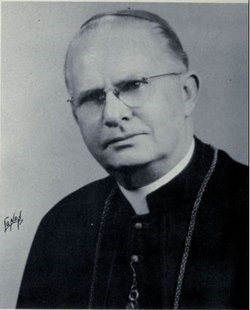“This is the story of a large minority group in the United States, our Latin-American brothers, generous and warm-hearted, simple, charming, and lovable yet segregated, persecuted and submerged.” With these words, Robert Emmet Lucey began his address to the Conference on Spanish Speaking People of the Southwest at Incarnate Word College in 1943; two years earlier in January, 1941, Pope Pius XII had appointed him the second archbishop of San Antonio. By this time, Lucey’s work as a parish priest and then bishop of Amarillo had already established him as a dynamic leader and an outspoken champion for social justice. These distinctions would evolve and highlight his ensuing 28 years shepherding the Archdiocese of San Antonio.
Robert Emmet Lucey was born March 16, 1891, in Los Angeles. After completing his undergraduate studies at St. Vincent’s College and St. Patrick’s Seminary, he matriculated to North American College in Rome, where he undertook graduate studies and then earned a doctorate in Sacred Theology there at the University of the Propaganda. Following his ordination in Rome, Father Lucey returned to California. During his work there as parish priest and hospital chaplain, as well as with Catholic Charities, he gained experience and knowledge in matters of social Doctrine between the church and state. It was here that he is said to have developed his passion to pursue social justice for members of minority groups, migrants, and laborers.
Upon his appointment as archbishop of San Antonio, Lucey immediately embarked on organizing programs and educating priests, who he considered the “standard bearers in the army of Christ.” In his first year, he established the Catholic Welfare Bureau, the Catholic Action Office, and, in August 1941, conducted a Summer School of Social Justice for Clergy of the Southwest. A strong proponent of communication between clergy and laity, the following year he established the Alamo Register as the official archdiocesan newspaper; in 1972, this became Today’s Catholic newspaper.
In 1945, Archbishop Lucey established and chaired the Committee for the Spanish-Speaking, which he would continue to chair until his retirement. Throughout his tenure, he was considered a pioneer in the fields of integration and labor relations. For example, in 1953, Lucey ordered the integration of all Catholic schools in the archdiocese — a full year before the Supreme Court ruling against segregation. Also ahead of the times, the archbishop created a system within the Archdiocese centered on equal pay and benefits to all workers. In his 1951 article “The Scandal of Migratory Labor” (America magazine), he wrote of migrants, “These people are human beings, largely defenseless against injustice. Their housing, food and wages are pitiful. The pattern of their economic life is unworthy of our nation.”
Lucey’s 28 years as archbishop of San Antonio were not without controversy and detractors. But nothing and no one can erase the indelible mark of the need for social justice that he left on the city’s Catholics and on all San Antonians. To learn more about Archbishop Lucey, the San Antonio People of Faith Historical Museum invite you to visit at 1201 Donaldson. They would also welcome any photos or other memorabilia of Archbishop Lucey that anyone might wish to donate. Call (210) 733-7152 for information.
Archbishop Robert Emmet Lucey served the archdiocese from 1941-1969. He was known as a champion of social justice and called “The Great Laborer” by many for his untiring dedication to and work within the Archdiocese.


